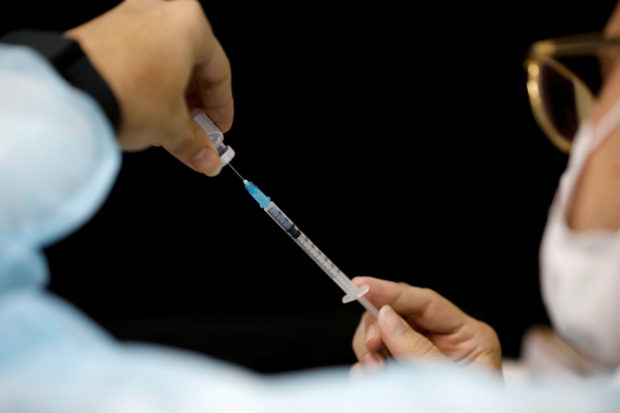
A medical worker prepares to administer a vaccination against the coronavirus disease (COVID-19) as Israel continues its national vaccination drive, during a third national COVID lockdown, in Ashdod, Israel, Jan. 4, 2021. (File photo from REUTERS)
JERUSALEM — Israel is discussing COVID-19 booster shots with drug companies, Prime Minister Naftali Bennett said on Wednesday, as the country grapples with an outbreak of the fast-spreading Delta variant.
The World Health Organization (WHO) said on Wednesday the Delta variant has been detected in at least 111 countries in the last two months and was likely to become the dominant variant globally over the coming months. In Israel, it makes up about 90% of confirmed cases, according to the Health Ministry.
“We are in a dialog with the pharma companies about the booster issue, whether a booster of the original shot or an adapted booster shot,” Bennett told a news conference in Jerusalem, where he detailed his cabinet’s strategy for curbing the Delta outbreak.
In Israel, about 60% of the 9.3 million population has received at least one dose of the vaccine produced by Pfizer and partner BioNtech. Pfizer did not immediately respond to a request for comment.
The variant, first identified in India, has led to a surge in cases worldwide and is setting back economic recovery plans.
Researchers and drugmakers are looking at tweaking vaccines quickly to prevent them from losing effectiveness against new, emerging variants.
Having driven down coronavirus infections to single-digit numbers and zero deaths, Israel lifted its social-distancing restrictions by mid-June. But the sharp rise in daily infections presently stand at a weekly average of about 500 and some curbs have been reintroduced.
Bennett appealed to the public and said Delta can be beaten back within five weeks without a costly lockdown if people act responsibly by getting vaccinated, wearing masks indoors, and keeping social distancing.
His strategy rests on an approach that says the high vaccination rates among risk groups will see far less severe COVID-19 cases than in previous outbreaks, even as infections climb.
Pfizer/BioNTech plans to ask U.S. regulators within weeks to authorize a booster dose of its COVID-19 vaccine, citing thus far unpublished evidence of greater risk of infection six months after inoculation and Delta’s spread.
U.S. and European Union authorities have said it’s unclear yet whether booster shots are needed. Scientists have said the companies’ move was premature.
Israel’s health ministry said on Monday there was still not enough unequivocal evidence for the necessity of a third booster shot for the wider public, though it has approved a third jab for people with compromised immune systems on a case by case basis.
Some studies have shown Pfizer’s vaccine to be highly effective against Delta, though somewhat reduced in comparison with other coronavirus strains.
“At the end of the day what really matters is that we get this pandemic under control, and we will not get it under control without boosting. That’s my strong opinion,” BioNTech CEO Ugur Sahin told a conference hosted by STAT News on Tuesday.